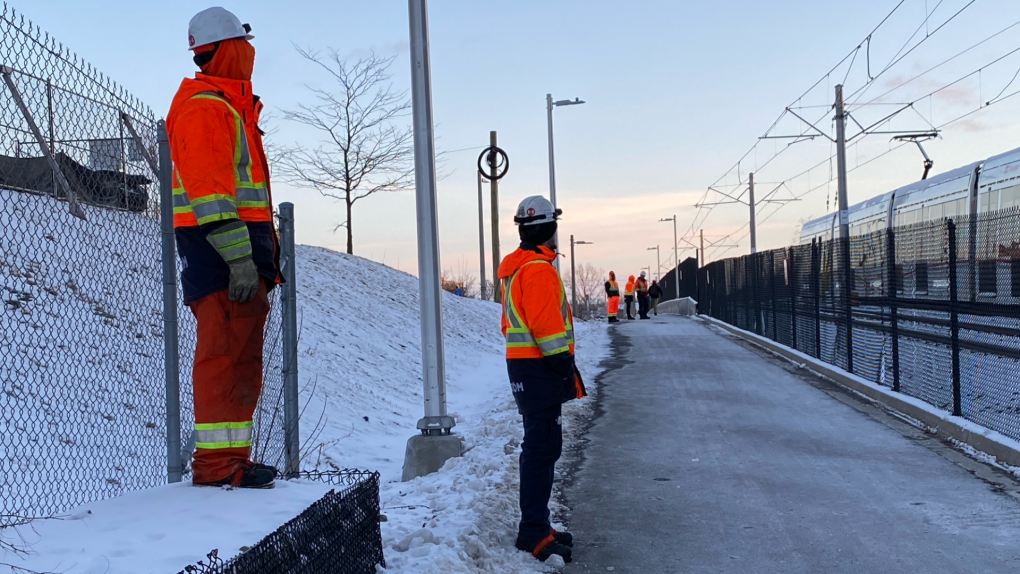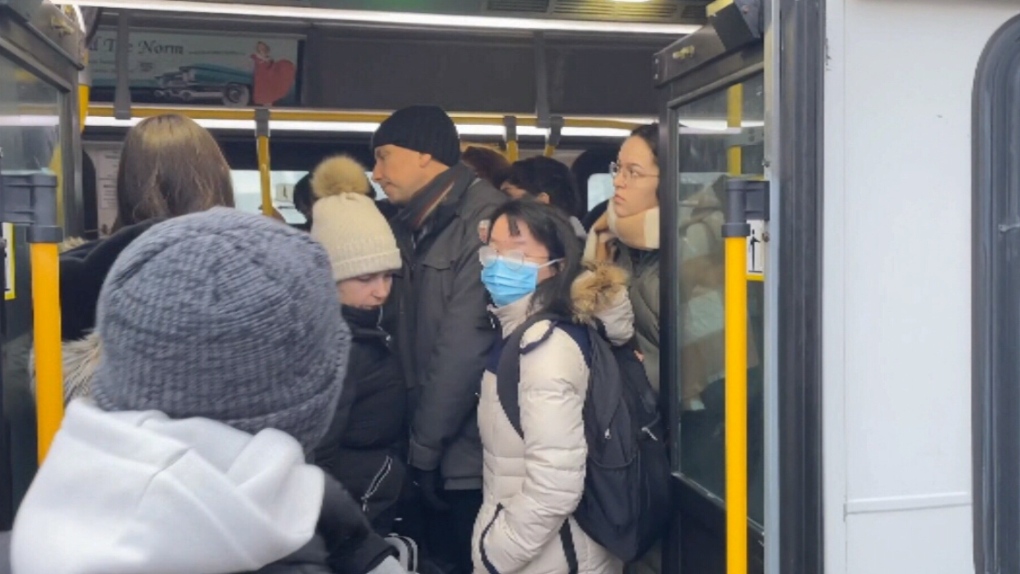Late start to ice clearing contributed to LRT disruption, but no idea why trains stopped
A late start to launching trains equipped with ice-clearing devices might have contributed to the six-day delay seen on Ottawa’s Confederation Line LRT, but the root cause of what stopped two trains during a freezing rain shower last week remains unknown.
OC Transpo and Rideau Transit Maintenance (RTM) officials held a news conference Tuesday evening to announce that full LRT service would resume within hours. A memo sent at 8:15 p.m. said service had finally resumed across the entire line, six days after those trains became stuck in the freezing rain.
RTM CEO Mario Guerra said that the first of two trains that remained stuck for six days was removed from the line Tuesday afternoon, and the second was on its way back to the maintenance yard as he was speaking. Then, he said, RTM would be running low-speed and stress tests in the area of track between uOttawa and Tremblay stations before full service resumes.
Reporters’ questions were largely focused on what went wrong and why.
OC Transpo general manager Renée Amilcar said a root cause investigation into why the trains stalled is underway and it’s too early to have an answer. Guerra said he did not want to speculate, but told reporters that one of the major issues that kept service offline for so long was ice buildup on the line.
“We know what happened. The ice buildup was so extreme that we had to take several steps to remove it and because of that, it took much longer than it normally would have,” Guerra said. “As to why it happened? I think Ms. Amilcar said it’s going to take us awhile to figure that one out, but I wouldn’t expect that to take too long.”
Guerra said a working group formed of experts from RTM, the city of Ottawa, and Alstom, the train manufacturer, has been formed and has already met once, and he anticipates some preliminary information “within weeks.”
 Workers are seen standing by the stalled LRT train near Lees Station, Jan. 10, 2023. OC Transpo says it expects to have full LRT service restored by the evening. (Leah Larocque/CTV News Ottawa)
Workers are seen standing by the stalled LRT train near Lees Station, Jan. 10, 2023. OC Transpo says it expects to have full LRT service restored by the evening. (Leah Larocque/CTV News Ottawa)
The stalled trains prevented other trains equipped with ice scrapers from moving in the section of the line that ended up out of service for nearly six full days. Those scrapers remained working in the east and west ends, which Guerra said is why that service was able to keep running.
He said there were 12 trains on the line that night equipped with ice scrapers but admitted they could have been launched earlier.
“One of the lessons learned is we could have had them out earlier than we actually did,” he said. “I’m not sure that it would have still made a difference in that particular area. That’s one of the things we need to look at from a root cause.”
Guerra said the number of scrapers is limited because they can damage the overhead wires if they are overused in dry conditions.
The area between uOttawa and Tremblay stations, where the trains stalled, has seen other issues with the overhead catenary system.
In February 2022, a wire on an LRT car broke and stopped service between uOttawa and Tremblay stations for about nine hours.
A lightning strike near Lees station damaged the line in July 2022, requiring approximately 900 metres of wire be replaced. Service was offline between uOttawa and Tremblay stations for four and a half days.
In December, there was a mechanical failure on the overhead catenary system near Lees Station, disrupting service between uOttawa and Hurdman stations for the better part of a day.
Guerra said Tuesday he does not believe there is a structural issue in that area.
“But that’s definitely something we’re looking at with the experts we brought in,” he said.
Asked about Stage 2, he said lessons learned from this event will be applied to expanded operations in the east and west. He also said that the extensions will be easier to maintain.
“It’s a pretty straight system without any curves or anything like that, so it’s a relatively good system to maintain, rather than the system downtown where you’ve got a lot of curves,” he explained.
The working group that is looking at solutions will also examine technology and tools that could be used to prevent ice buildup or clear it away more quickly.
The stalled trains had some faults, Guerra said, but were not physically damaged. He expects they will return to service quickly after they’re inspected in the maintenance yard.
Amilcar thanked customers for their patience and vowed to improve service.
“I know that your commute has been longer and difficult. These last few days have been a cold start to the new year,” she said. “We will all learn from this experience and improve service. I thank you for your understanding and I appreciate, sincerely, your patience.”
Riders relieved at LRT opening
Movement on the line between Blair and Rideau stations was a sight OC transit riders have been eagerly waiting for. The LRT service resumed Tuesday night just after 8 p.m. following six days of disruptions.
“I'm pumped the LRT is back,” said Greg Smith, one of the first passengers on a train arriving at Blair station from Rideau Tuersday evening.
“I got on a bus and they said the LRT was up so I jumped off the bus and got on the LRT,” he said. “Nobody was on it and I got here super fast.”
“Right at Rideau, the guy called out on the intercom saying this train was going to Blair and I was super happy,” said UOttawa student Dan Celestin.
For nearly a week, riders had been relying on overcrowded or delayed replacement buses that shuttled thousands of passengers around.
“It's a huge relief to see the trains moving and that we can avoid that really hellish commute that people have been experiencing for the last couple of days,” said Coun. Jeff Leiper, who was at Hurdman station Tuesday night as the second stalled train cleared the tracks.
Riders say they are still waiting on answers but passengers were looking forward to a better ride in during the morning rush Wednesday.
“It makes my life so simple again. I'm really happy there's an LRT,” said Smith.
More replacement buses called in Tuesday
OC Transpo ran more replacement buses on Tuesday after a packed commute Monday.
The additional R1 buses come after many commuters expressed frustration with crowded buses and long waits to get to and from work.
"We've listened to your feedback & adjusted R1 service to better serve customers," OC Transpo tweeted on Tuesday morning.
Despite the additional buses, some passengers still experienced delays and overcrowding, particularly at Hurdman Station, Amilcar said Tuesday morning.
"Wherever possible, extra R1 buses were sent to Hurdman to increase capacity," she said.
 Passengers boarding an R1 bus at Lees Station on Tuesday, Jan. 10, 2023. (Jim O'Grady/CTV News Ottawa)
Passengers boarding an R1 bus at Lees Station on Tuesday, Jan. 10, 2023. (Jim O'Grady/CTV News Ottawa)
Service along the LRT during Tuesday's morning and afternoon commutes ran just as it did on Monday. O-Train service was running between Tunney’s Pasture to uOttawa in the west and Tremblay and Blair in the east.
R1 bus service was operating between Blair and Rideau stations, skipping Cyrville Station.
One apparent effect of the additional R1 buses is a further strain on routes elsewhere in the system. About 50 trip cancellations were reported on OC Transpo's live Twitter feed Tuesday morning.
Nearly 70 bus cancellations were reported between 3 and 6 p.m.
OC Transpo said it expects full LRT service to launch on time Wednesday morning but staff will still be at stations to help customers.
- with files from Jackie Perez, CTV News Ottawa
CTVNews.ca Top Stories

B.C. tenants evicted for landlord's use after refusing large rent increase to take over neighbouring suite
Ashley Dickey and her mother rented part of the same Coquitlam duplex in three different decades under three different landlords.
Mountain guide dies after falling into a crevasse in Banff National Park
A man who fell into a crevasse while leading a backcountry ski group deep in the Canadian Rockies has died.
Expert warns of food consumption habits amid rising prices
A new survey by Dalhousie University's Agri-Food Analytics Lab asked Canadians about their food consumption habits amid rising prices.
MPP Sarah Jama asked to leave Ontario legislature for wearing keffiyeh
MPP Sarah Jama was asked to leave the Legislative Assembly of Ontario by House Speaker Ted Arnott on Thursday for wearing a keffiyeh, a garment which has been banned at Queen’s Park.
Charlie Woods, son of Tiger, shoots 81 in U.S. Open qualifier
Charlie Woods failed to advance in a U.S. Open local qualifying event Thursday, shooting a 9-over 81 at Legacy Golf & Tennis Club.
Ex-tabloid publisher testifies he scooped up possibly damaging tales to shield his old friend Trump
As Donald Trump was running for president in 2016, his old friend at the National Enquirer was scooping up potentially damaging stories about the candidate and paying out tens of thousands of dollars to keep them from the public eye.
Here's why provinces aren't following Saskatchewan's lead on the carbon tax home heating fight
After Prime Minister Justin Trudeau said the federal government would still send Canada Carbon Rebate cheques to Saskatchewan residents, despite Saskatchewan Premier Scott Moe's decision to stop collecting the carbon tax on natural gas or home heating, questions were raised about whether other provinces would follow suit. CTV News reached out across the country and here's what we found out.
Montreal actress calls Weinstein ruling 'discouraging' but not surprising
A Montreal actress, who has previously detailed incidents she had with disgraced Hollywood producer Harvey Weinstein, says a New York Court of Appeals decision overturning his 2020 rape conviction is 'discouraging' but not surprising.
Caleb Williams, Jayden Daniels and Drake Maye make it four NFL drafts with quarterbacks going 1-3
Caleb Williams is heading to the Windy City, aiming to become the franchise quarterback Chicago has sought for decades.
































